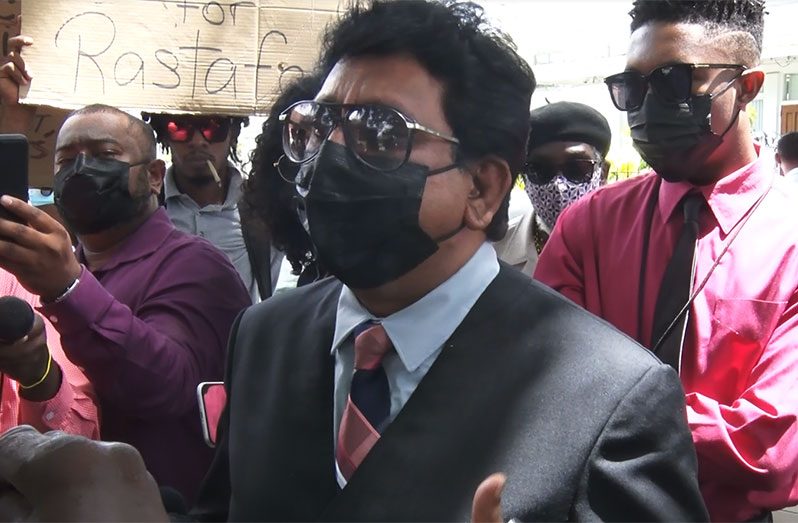–says Nandlall, following his election as Chairman of Parliamentary Select Committee
THE election of Attorney-General and Minister of Legal Affairs, Anil Nandlall, S.C., as Chairman of the Parliamentary Special Select Committee, has paved the way for consultations to commence on the proposed amendments set out in the Narcotic Drugs and Psychotropic Substances Control Amendment Bill 2021.
This bill seeks to remove “jail time” as the automatic sentence for persons found to be in possession of a small quantity of marijuana.
The way forward regarding the bill was outlined by Nandlall during an engagement with members of the Rastafarian movement who were protesting in front of the Attorney-General’s Chambers on Monday.

The bill, which introduces amendments to seven key sections of the principal Act, was read for the first time in the National Assembly in January 2021, and the primary objective of the amendments is the removal of custodial sentences (time served in prison) for the possession of small quantities of marijuana; this was a promise made by the People’s Progressive Party/Civic in their 2020 elections manifesto.
Nandlall informed the representatives of the Rastafarian faith that while the Narcotic Drugs and Psychotropic Substances Control Amendment Bill 2021 was tabled in the National Assembly there were some concerns with the quantum that is to carry a non-custodial sentence and as a consequence it was referred to the Special Select Committee.
“We do not believe in a process that is unilateral, we believe that in every aspect of public decision making we must act consensually and we must act after consulting the stakeholders. We can’t impose a law on the people without an input from the people because the law will not be obeyed; as a result we have decided to take the bill to a special select committee,” he said.
Representatives of the House of Nyabinghi asked the Attorney-General to suspend the legislation prohibiting the use of marijuana and classifying it as a narcotic, since the substance is consumed for the “spiritual, indigenous and culture belief” of the Rastafarian movement.
The Attorney-General apprised the Rastafarians of Guyana’s legal system and informed them that the law cannot be suspended spontaneously, but it must undergo the requisite legislative procedures to be struck out or amended.
“We cannot suspend the law, our system doesn’t operate that way. We have to pass another law to amend that law or to repeal it completely… we have decided the process of an amendment, but until that amendment is passed the current law will be in force that is how the law is,” he related.
The Rastafarians also quoted Articles of the Constitution of Guyana which guarantee freedom of religious practice, as they explained that while some people may consume the substance for recreation or medicinal purposes, the Rastafarian movement is a faith-based organisation which engages in the use of marijuana as a “sacrament” in the practice of the religion.
“As a government we have to ensure that we address all the interests in a society; there is another view out there that may contradict yours, but we have passed that stage and we are at a stage where we have a bill to address your concerns which is a fundamental accomplishment,” Nandlall informed the Rastafarians.
The Attorney-General assured the representatives of community that the Select Committee will invite them to make their submissions, which will be taken into consideration and reflected in the final product of the Special Select Committee.
This publication was, later in the day, informed that Nandlall was elected Chairman of the Special Parliamentary Select Committee, which will be scrutinising the bill before it makes its way back to the House for a vote.
The government members on the Special Select Committee are Minister of Governance and Parliamentary Affairs, Gail Teixeira; Minister of Education, Priya Manickchand; Minister of Home Affairs, Robeson Benn; and Minister of Culture, Youth and Sport, Charles Ramson, while the Opposition Members of Parliament who are on the Committee are Khemraj Ramjattan, Annette Ferguson, Amanza Walton-Desir and Sherod Duncan.
The proposed amendments introduce mandatory counselling by a certified counsellor specified by the court for anyone convicted for being in possession of cannabis which does not exceed 15 grammes. The period of counselling will be determined by the counsellor after an assessment.
For persons convicted after being in the possession of a quantity of cannabis which exceeds 15 grammes but does not exceed 30 grammes, the court shall make an order requiring that person to perform community service. Section five of the principal Act, which pertains to the penalty for trafficking narcotic, is also slated to be amended.
Section two of the principal Act shifts the burden of proof upon the defendant, once found in possession of more than 15 grammes of cannabis, to prove that he is in possession of the narcotic for a purpose other than the purpose of trafficking.
The amendment will see this being changed to 30 grammes. Other sections proposed to be amended are Sections 12, 72 and 73 of the principal Act.
While amendments to the Narcotic Drugs and Psychotropic Substance Control Act were promised by the A Partnership for National Unity + Alliance for Change (APNU+AFC) Coalition as early as 2015, it never came to fruition.
In 2015, former AFC Member of Parliament (MP), Michael Carrington, had tabled a bill in the National Assembly to amend the Act but it was never debated.
In December 2020, members of the APNU+AFC Opposition presented copies of their version of the amended bill to the National Assembly. They, however, cited the inactivity of the National Assembly in 2019 due to the passage of the no-confidence motion on December 21, 2018, as the reason why the bill was never debated.
When the bill was debated in January, 2021, the Opposition-sponsored motion presented by Duncan was defeated and the Government-sponsored bill was sent to a Special Select Committee for further consultation.




.png)









